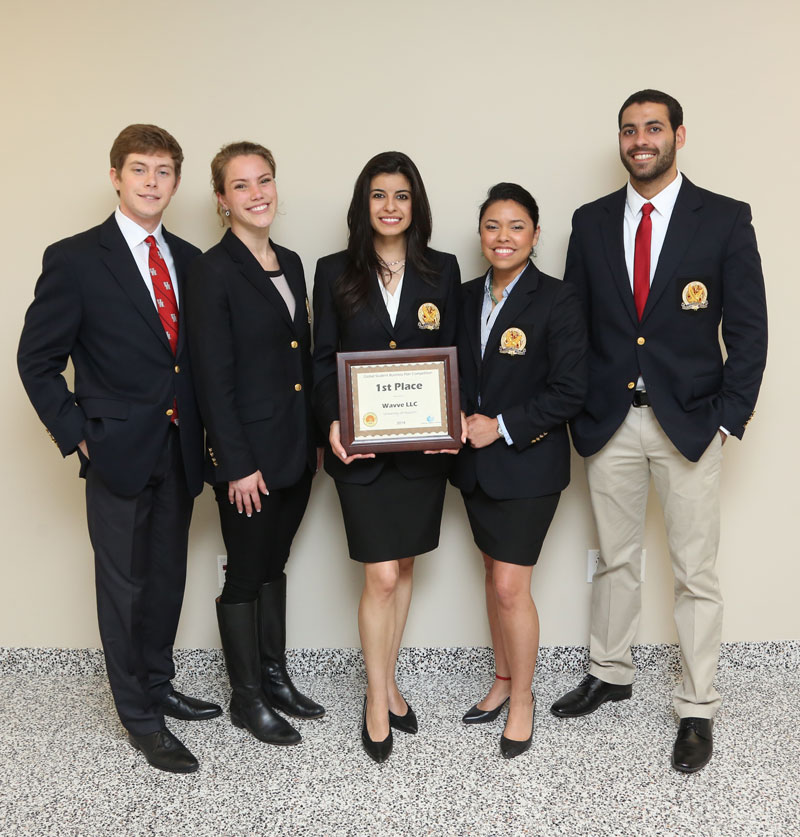Entrepreneurship Students Ride Wavve of Success in Business Plan Competition
Wolff Center for Entrepreneurship Team Takes First Place in Global Student Business Plan Competition
Published on March 26, 2014

Wolff Center for Entrepreneurship students Sergey Petrov, Julia Lonnegren, Valeria Bernadac, Ivette Rubio and Eric Beydoun bested teams from across the nation during the Global Student Business Plan Competition at the College of the Bahamas.
EDITOR’S NOTE: This is the third in a series of stories highlighting the success of student business plan teams from the Bauer College’s Wolff Center for Entrepreneurship in Spring 2014. Each year, WCE students work with the university’s Division of Research to develop commercialization plans for technologies developed at the university. Over the past 12 years, Bauer teams have had 21 podium finishes in national business plan competitions.
Five international students from the Wolff Center for Entrepreneurship at the C. T. Bauer College of Business won first place against peers from across the nation and the Central America region for a business plan that addresses the lack of clean and safe drinking water worldwide.
The team, which included Valeria Bernadac, Eric Beydoun, Julia Lonnegren, Sergey Petrov and Ivette Rubio, won the Global Student Business Plan Competition held March 18-22 at the College of the Bahamas. Their business plan focused on a technology developed by Debora Rodrigues, a UH civil engineering assistant professor, which focuses on purifying water using a nanotechnology coating solution.
Dubbed “Wavve” (each letter represents the first letter of the word “water” in English, Spanish, Swedish, Russian and French, the native languages of the students on the team), the business is designed to sell its product to existing water filtration companies. Rodrigues’ coating technology enhances existing water purification membranes, making water potable in underdeveloped countries.
“Water is an international problem, and we are an international team, trying to solve it,” Beydoun said.
Rodrigues has international roots, as a native of Brazil who saw the poor water conditions in her home country growing up, Lonnegren said.
“We saw a huge potential in this nanotechnology, and with the rising global water crisis, we found this technology amazing,” she said.
"To enter the market with a disruptive technology, combined with the tools that we have been given at the Wolff Center for Entrepreneurship, is an amazing concept and opportunity that we as students have been given."
—Julia Lonnegren, Wolff Center for Entrepreneurship student
Wavve is the most efficient and effective solution in the market for making water across the globe safe to drink, Beydoun said.
“Filters are often known to remove chlorine taste and odor, sometimes debris and bacteria,” he added. “Wavve will allow these water filters to simultaneously remove heavy metals, harmful chemicals and pollutants, as well as kill bacteria and viruses.”
The students presented the Wavve business plan at the Global Student Business Plan Competition in late March, competing against other undergraduate entrepreneurship students from across the globe. The Bauer team placed first, with teams from Purdue and Rice University placing second and third respectively. Another Bauer WCE team with a business plan focused on CARA, an intellectual property project involving C-voltaics, placed fourth.
As the team prepares for their next competition — the Rice Business Plan Competition on April 10 — they aim to keep their momentum going by focusing on their passion for a product with global implications, Lonnegren said.
“To enter the market with a disruptive technology, combined with the tools that we have been given at the Wolff Center for Entrepreneurship, is an amazing concept and opportunity that we as students have been given,” she added. “It has been a fantastic learning experience, and we are extremely fortunate to be able to constantly combine our theoretical academics and simultaneously apply it into the practice of commercializing an Intellectual Property from the University of Houston.”